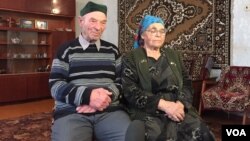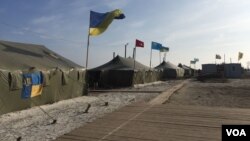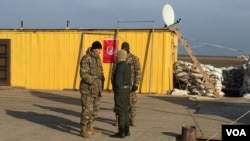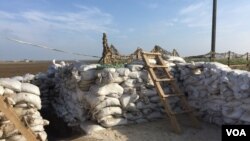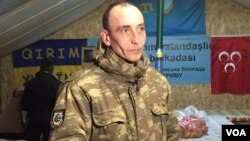Two years after Russia annexed Ukraine’s Crimean peninsula, resentment is building among the region's Tatars. The Muslim minority group is native to Crimea. But many have been leaving the peninsula, saying Russian authorities are running them out of government jobs and taking away the autonomy that they once enjoyed under Ukrainian rule.
Seeing Moscow again controlling their native Crimea brings ugly memories to Azime Umerova and her husband. They remember 1944 when Soviet leader Josef Stalin deported their families and thousands of other Tatars from the peninsula.
At her home on Ukrainian-controlled territory just a few kilometers from where Russian authorities have established a new international border, Umerova, 77, describes the day Stalin's security forces showed up at her family's house and ordered family members out at gunpoint.
"They gave us an order to get ready quickly, that we had 15 minutes to take our most important belongings," she said. "Everyone was tremendously upset and shouting 'where and why.' Nobody knew anything. Everyone was crying, both children and adults. And soldiers with automatic guns were pushing us to pack into the boxcars."
The journey to the deserts of Uzbekistan was torturous and they endured years of slave labor. Stalin accused the Tatars, who chose their traditional way of life over the forced collectivization and atheism of Stalinist Russia, of treason.
Feelings of bitterness
Umerova is famous in the town for the delicious hard candy she makes and sells, and which she proudly displays. Two years after her people once again lost Crimea to the Russians, it is hard to fight feelings of bitterness against Russian President Vladimir Putin.
"If I was a bird, I would fly over and destroy the Kremlin down to the last brick and him with it," she tells VOA. The words are stronger than expected from a grandmother whose bright smile, repeated hugs to a reporter and thick eyeglasses project an image of warmth and tenderness.
Her husband of 58 years, Rustem Umerov, 81, was also deported as a child and suffered similar experiences. He shares his wife's sentiments on what has happened in Crimea in the past two years.
He said, "every nationality has its motherland, and ours is Crimea, so how can we not feel sick about it?"
At the town mosque, there is anger at what is perceived as inaction by Ukraine's leaders. A group of men gathering for morning prayers say Ukraine has given up on Crimea and never really put up a fight.
"The problem of Crimea is mentioned only in passing. It would seem there is no problem there, that everything is all right there, and that we have resigned ourselves to the situation," says their imam, who identified himself only as Usein.
Volunteer battalion
Despite a doubling of manpower and the defense budget over the last year, Ukraine's armed forces are stretched as the war against Russian-backed separatists drags on in the country’s eastern Donetsk and Luhansk regions.
Activists backed by Turkey and other majority Muslim countries have taken matters into their own hands. Last September, they set up a fully equipped force called the Noman Chelibijihan Battalion. VOA visited their camp, with tents and barricades, built next to the highway that leads north on a stretch of land connecting the Ukrainian mainland with the Crimean peninsula.
Men and women in combat uniforms and ski masks gather inside the tents. They stand at the barricades, looking across the horizon where a Russian flag waves at a distance of about 2 kilometers from the first Russian checkpoint on the highway from mainland Ukraine.
"We are ready for everything," Haydarma, one of the battalion's members, says. "Coming here is not a simple proposition, and our goals are not simple. Personally, I am ready to give my life for this."
Members say they do not rule out a Russian attack and are ready for it. They declined to answer questions about weaponry, but asserted they are "fully equipped." Behind the tents is a line of trenches, sandbag barricades, and lookout points.
The group's leaders declined to discuss their numbers, but told VOA they are no fewer than 100, comprised mostly of Tatars but also include Chechens, Ukrainians, and Afghans. They receive training from Ukrainian military advisers.
Ukraine's government allows the group to operate but battalion leaders say Kyiv does not provide support other than training.
Enforcing blockade
For now, their actions have been limited to enforcing a blockade of cargo from Ukraine to Russian-controlled Crimea. Battalion members have set up a checkpoint next to their camp, where they stop large trucks traveling to the peninsula.
Their aim is to stop any form of support from Ukraine to Crimea as long as the Russians control the territory.
The group has not claimed responsibility for acts of sabotage on power lines that supply Ukrainian electricity to the peninsula. The acts, widely believed to have been carried out by Tatar activists, have resulted in blackouts of several days and sent Russian officials scrambling to install generators and find other sources.
The actions have been no more than a nuisance for Russia, and there is no hint whatsoever that the Tatars' actions are having any effect toward reversing the annexation of the territory.
But the volunteers say they cannot sit idle and remain silent.
"If we do not fight for Crimea, then who else will?" one volunteer asked.
